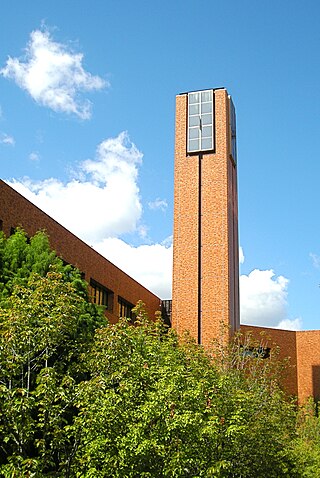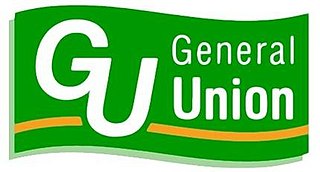An Assistant Language Teacher (ALT) is a foreign national serving as an assistant teacher in a Japanese classroom, particularly for English.

Kansai Gaidai University, almost always abbreviated Kansai Gaidai (関西外大), is located in Hirakata, Osaka, Japan. It is a private university focusing on foreign language studies. Kansai is the proper name of the large region where it is located, which includes the cities of Kyoto, Osaka and Kobe. Gaidai is a contraction of Gaikokugo Daigaku, which literally means "foreign language university". Gaidai is part of Kansai Science City, which is undergoing construction around the campus.
Eikaiwa kyōshitsu (英会話教室) or Eikaiwa gakkō (英会話学校) are English conversation schools, usually privately operated, in Japan. It is a combination of the word eikaiwa and gakkō or kyōshitsu.
Berlitz Corporation is a language education and leadership training company which is based in Princeton, New Jersey. The company was founded in 1878 by Maximilian Berlitz in Providence, Rhode Island in the United States. Berlitz Corporation is owned by “Berlitz Holdings”, a company established through a 100% investment by ILSC Holdings LP, with more than 547 company-owned and franchised locations in more than 70 countries.

Nova is a large eikaiwa school in Japan. It was by far the largest company of this type until its widely publicized collapse in October 2007. Before its bankruptcy, Nova employed approximately 15,000 people across a group of companies that supported the operations of and extended out from the "Intercultural Network" of its language schools. The scope of its business operations reached its peak in February 2007 following a rapid expansion of its chain to 924 Nova branches plus a Multimedia Center located in Osaka.
GEOS was one of the Big Four private eikaiwa, or English conversation teaching companies, in Japan. Its extensive network of overseas schools made it the world's largest language school chain. The firm went into bankruptcy in Japan on April 20, 2010. Its headquarters were in the Shin Osaki Kangyo Building in Shinagawa, Tokyo.
Aeon is a chain of English conversation teaching companies in Japan. It is considered one of the historical "Big Four" eikaiwa schools. The company operates 320 branch schools throughout Japan, and maintains staff recruitment offices in New York City and Los Angeles.

Osaka Gakuin University, also known as Osaka Graduate University (OGU), is a mid-sized, mid-level private liberal arts university located in Suita, Osaka Prefecture, Japan. The university focuses on law, economics, and international studies, but still provides a wide array of other subjects for study.

Gaba Corporation is a chain of eikaiwa schools in Japan. The company was founded in July 1995 and is currently headquartered in Shinjuku Ward in Tokyo with learning studios in the Tokyo, Chiba, Yokohama, Nagoya, Osaka, Kyoto, Kobe, and Fukuoka areas. The current president and CEO is Daisuke Terada.
Link Interac Inc. is a Japanese comprehensive educational consultation company, founded in 1972. The name is an acronym for International Education Research and Analysis Corporation, although the company has never operated under that name. Interac originally concentrated on teaching business English, then shifted focus to providing Assistant Language Teachers (ALTs) to public elementary, middle, and high schools. Interac provides teachers to schools around Japan.

The General Union is a labor union founded in 1991 and headquartered in Osaka, Japan. Membership is open to all nationalities and all workers. It has members working in trading companies, factories and restaurants but the majority of members are teachers and staff who are employed in language education at private conversation schools, high schools and universities in the Kansai and Chubu regions of Japan. Union members work at universities such as Ritsumeikan University, and language schools such as ECC, Berlitz and Gaba. Recent years have also seen the union launching major organizing drives among South American workers in Japan, along with Filipino workers.
AEON-Amity, more commonly known as Amity is a chain of private English schools (eikaiwa) in Japan, owned by, but operated independently of the larger AEON corporation. While AEON schools proper teach mostly adult students, Amity schools service almost exclusively children, from babies to teenagers.
American Club (アメリカンクラブ株式会社) is a company based in the Hiramatsuhonchō (平松本町) district of Utsunomiya, Tochigi, Japan which has been involved in the "eikaiwa" business.

English-language education in Japan began as early as 1600 with the initial contacts between the Japanese and Europeans. Almost all students graduating from high school in Japan have had several years of English language education; however, many still do not have fluent English conversation abilities.
Seiha English Academy is a private eikaiwa English conversation school run by Seiha Network Co., Ltd. started primarily in western Japan for children from three months to 14 years old. It now has schools all over Japan from Hokkaido to Okinawa. As of March, 2019, Seiha has 743 classrooms all around Japan and is employing more than 2,000 teachers. Students enrolled in Seiha's English Network recently passed the 50,000 student mark which makes Seiha the largest children's English School in Japan.

Coco Juku (COCO塾), which stands for Communication Competence, was an English conversation school (eikaiwa) in Japan. The school was founded in 2012 by Nichii Gakkan, which also owns the English conversation school Gaba Corporation. Coco Juku's lessons began on April 10, 2012 and the "Coco Junior" program for children began in April 2013.
Berlitz Japan, Inc. (ベルリッツ・ジャパン株式会社) is a chain of eikaiwa English conversation schools in Japan. It is a branch of Berlitz Corporation, a subsidiary of ILSC Holdings LP.
Peppy Kids Club is a private eikaiwa English conversation school run by iTTTi Japan for children from 2.5 years old to high-school age. As of 2012, Peppy Kids Club has over 1400 locations with 95,000 students in every prefecture including Okinawa. As of February 2011 it had 1627 Japanese and 421 foreign staff. Teachers at Peppy Kids Club teach independently and are responsible for the welfare of the students from the time they arrive at the classroom to the time the students' parents pick them up.
Teaching English as a foreign language (TEFL), Teaching English as a second language (TESL) or Teaching English to speakers of other languages (TESOL) are terms that refer to teaching English to students whose first language is not English.







